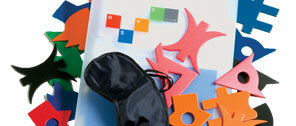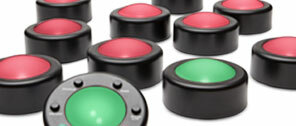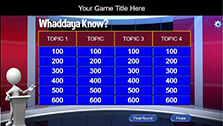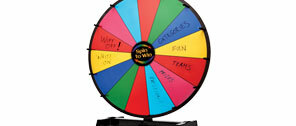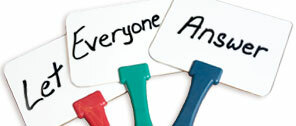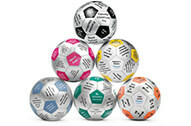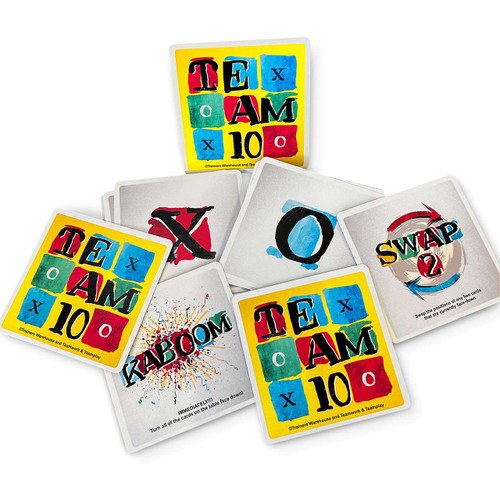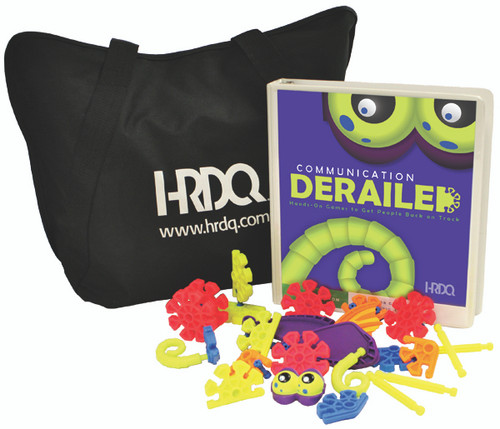Team 10 is a team assessment and group challenge activity that encourages accurate communication, adaptation, and creative problem-solving. Team 10 is an ideal table game for conferences, training events, workshops, or other group gatherings. Play the game with 2-12 players. Expect 10-20 minutes for game play, plus 10-15 for a debriefing and discussion.
SUPER-EASY TO FACILITATE
OVERVIEW: Taking turns, each player will flip 2 cards at a time, until the team reveals 10 cards with all Xs or all Os
PLAYERS: Play the game with 2-12 players.
TIMING: Expect 10-20 minutes for game play, plus 10-15 for a debriefing and discussion.
SET UP:
- Randomly place the following 22 cards face down on a table:
- 18 Xs and Os (Either 10 “X” and 8 “O” OR 10 “O” and 8 “X” cards).
- 4 “Word” cards (Kaboom, Move it, Swap 2, Scramble)
- Scatter the “Rules” cards face up for easy reference.
- Invite the group to gather around, read through the rules, and check for understanding, Encourage the group to spend a minute or two planning how they will proceed before starting the game.
WHAT'S INCLUDED IN THE TEAM 10 DECK
The deck has all you need to effectively facilitate and play Team 10:
- HOW TO PLAY Facilitation Notes
- RULES - 2 cards show the rules so that they're visible to all players
- LEARNING TAKEAWAYS - typical learning points drawn from playing the Team 10 communication game
- REVIEW & REFLECTION IDEAS - 12 questions to reflect, debrief, and discuss the game, focusing on preparation, play, and going forward
- X and O cards - we include a few extra for two reasons: 1) you have a replacement card if you lose one; and 2) so you can switch up with is the winning "hand"
- "WORD" cards - These cards (Kaboom, Move it, Swap 2, Scramble) interrupt players mid-game, requiring them to regroup, restrategize, and reflect on how different players deal with adversity or interruptions.
THE RULES
These guidelines help both the facilitator and players maximize the game experience:
- Player can flip only two cards face up OR two cards face down, during each turn.
- Player cannot turn one card face-up and another card face-down in the same turn.
- Each card must remain in the same general location (unless instructed otherwise).
- A maximum of 10 cards can be face-up at any time.
- If a card with a word appears, quickly follow the instructions on the card.
- Take turns flipping cards. Include every team member.
- No taking notes or pictures! All communication must be verbal.
- The game ends when 10 cards with the same symbol are face-up, and all others are face down.
FACILITATION TIPS
TAKE AWAYS
Typical insights from successfully completing the Team 10 challenge include:
- Heightened awareness of the skills and talents present in the team.
- Impact of committing to a single course of action; difficulty in changing direction after a goal is set.
- Exploring various techniques for problem solving, generating solutions, creativity, adaptability, communication, consensus building, teamwork and decision making.
- The ability to work with time limitations and adapt to setbacks.
- Abiding by rules can be challenging; some may be more comfortable with bending or questioning rules.
- The importance of honesty and ethical behavior.
OPPORTUNITIES FOR GROWTH, LEARNING, AND DISCUSSION
Team 10 is a versatile game that can bring out many learning moments.
Just by watching teams play for as little as 10 minutes, you will have a
glimpse into the skills of your groups, seeing how they deal with a variety
of team dynamics:
- Decision Making. How do they make decisions? Do they listen
to a range of perspectives or the loudest voice? How do they function as a group? - Divergent perspectives. How do they make sure everyone’s voice is heard? Do they see issues
from a variety of different angles? How does shifting positions or putting themselves in
another’s shoes change their view? - Dealing with adversity. What happens to a group when something unexpected happens (i.e. if
they’re working on a project but a key vendor falls through)? How do they capture, remember,
and draw on organizational memories? - Rule‐following & Ethics. What do teams do if they inadvertently break a rule? How do
individuals respond? How does the team respond? Who blows the whistle? What if it’s on
purpose? How does the team manage such ethical challenges? - Importance of Strategizing and Planning. What are the benefits of preparation and discussion?
How can teams get everyone on the same page from the start? Why is that important? How do
they balance the need for strategizing with the amount of time it can take? - Leadership. How do leaders emerge? What does leadership look like? How do leaders make
others feel? How do teams build inclusion and reach consensus? - Dealing with Frustration. Frustration happens in real life. The question is how people deal with
it. Do they give up, act out, charge forward, move with haste, or pause to regroup?
Of course, which of these the facilitator focuses on will depend on: 1) the team’s experience during the
game, 2) organizational needs, and 3) the facilitator’s ability to identify and home in on pertinent
learning moments.
DRAWING OUT THESE TEACHABLE MOMENTS – FINAL DEBRIEF OR STOP‐ACTION
Understanding your goals, you can draw out conversations and reflection EITHER during play or after. If
you notice a teachable moment. Feel free to stop action and discuss any of these questions right when
they see the “teachable moment.”
©Trainers Warehouse. TEAM 10 was developed by Guido Cremonesi of Simple Training (www.simpletraining.it) and Jim Cain of Teamwork & Teamplay (www.teamworkandteamplay.com) and produced by Trainers Warehouse (www.trainerswarehouse.com).
COMPARISON CHART
Not sure which team-building activity is right for your group? Trainers Warehouse offers a variety of experiential learning games that build skills in communication, collaboration, adaptability, leadership, and conflict resolution. Use the chart below to compare five of our most popular activities—PuzzleBlind®, Helium Stick®, TeamWRITER®, Shape Up!®, and Team 10®—and choose the one that best fits your training goals, group size, and workshop format.
| Activity | Ideal Group Size | Core Skills Developed | Time Required | Key Dynamic | Best For |
|---|---|---|---|---|---|
| PuzzleBlind® | 4–8 players per puzzle (parallel teams for larger groups) | Communication, trust, listening, coaching, conflict resolution | ~30–40 minutes (play + debrief) | Builders are blindfolded, coaches give verbal instructions | Leadership training, conflict resolution, communication workshops |
| Helium Stick® | 8–12 participants per stick | Communication, alignment, group focus, patience | ~20–30 minutes (setup + play + debrief) | Teams must lower a lightweight rod without it rising up | Quick energizer, communication warm-up, leadership retreats |
| TeamWRITER® | 6–12 participants (expandable with multiple pens/strings) | Collaboration, interdependence, coordination, listening | ~20–30 minutes (assembly + play + debrief) | Teams collectively pull strings to guide a pen and write/draw | Collaboration workshops, leadership development, trust building |
| Shape Up!® | Small teams of 4–6 per set (multiple sets scale up) | Problem-solving, communication, collaboration, | ~20-30 minutes (multiple rounds + debrief) | Players must figure out which of their pieces is a duplicate | Problem-solving workshops, collaboration training, communication skill-building |
| Team 10® | Groups of 4–12 players | Adaptability, resilience, dealing with disruption, collaborative planning | ~20–30 minutes (play + debrief) | Teams search for 10 matching cards until a “Scramble” card forces to begin again | Change management workshops, adaptability training, and teamwork energizer |

